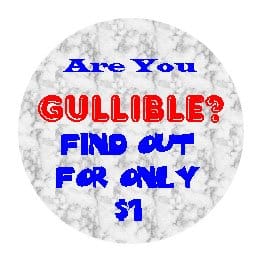It’s time to revisit  something that has bothered me for at least a couple of decades. That is, while horse owners seem more than happy to give their horses any number of supplements, the fact is that, no matter what the supplements promise, horse owners can’t really know if the supplements do any good.
something that has bothered me for at least a couple of decades. That is, while horse owners seem more than happy to give their horses any number of supplements, the fact is that, no matter what the supplements promise, horse owners can’t really know if the supplements do any good.
There are two big reasons for this.
1. There’s no requirement that any of the supplements actually do what they say they’re going to do. Read that again; the claims made by supplements don’t have to be supported by any evidence. If you buy a watch, you have a reasonable assurance that it’s going to keep time, because that’s what watches do. But with supplements, just about any claim can be made, as long as the claim isn’t specific (you know, this or that “cures” something), and there’s no requirement to prove that it does anything.
2. Even if a product were to do what it was claimed to do, horse owners still wouldn’t necessarily be assured that it would be effective, because there’s no way to assure that the product that they’re giving has in it what the labels says it contains.
This is a real problem in the human field. (CLICK HERE TO READ THE ARTICLE – American Roulette – Contaminated Dietary Supplements). The article notes that the combination of no regulatory oversight of the dietary supplement industry, combined with a lack of resources by any agency that is supposed to oversee the manufacture of such products, has led to human supplement takers playing an involuntary game of therapeutic Russian
Roulette. Manufacturers can put just about anything – or nothing – into their supplement products, and there’s really not much that consumers can do; there’s no practical way for an individual consumer to know what he or she is really getting in the product. In addition, products are continuously being put into the human market with claims that can’t be supported, even if the product contains what it says is on the label (which it often doesn’t/). Finally, even though manufacturers of supplement products are required by law (since 2007) to report serious supplement-related adverse events to the United States Food and Drug Administration (FDA), the majority of them – estimated at 50,000 events per year – go unreported.
People certainly don’t seem to understand the extent of the problem. They seem to want to take the claims made for supplements at face value, that is, they seem think that if a product says it can do something, it can, and it does, and that someone is making sure of it. Wrong. As a result, in 2002, a Harris poll found that consumers believed that dietary supplements were  approved by a government agency prior to being sold. That’s not true – supplements can be put onto the market without any approval at all, as long as they don’t make specific disease-preventing claims (for example, a supplement can claim to “support” joint health, as long as it doesn’t claim to help cure arthritis). The faulty beliefs about supplement regulation aren’t limited to consumers; a recent survey of internal medicine residents found that one-third believed (wrongly) that dietary supplements required FDA approval, and the majority didn’t know that it was mandatory to report adverse events to the FDA.
approved by a government agency prior to being sold. That’s not true – supplements can be put onto the market without any approval at all, as long as they don’t make specific disease-preventing claims (for example, a supplement can claim to “support” joint health, as long as it doesn’t claim to help cure arthritis). The faulty beliefs about supplement regulation aren’t limited to consumers; a recent survey of internal medicine residents found that one-third believed (wrongly) that dietary supplements required FDA approval, and the majority didn’t know that it was mandatory to report adverse events to the FDA.
Perhaps even worse, some manufacturers of human supplement products have spiked supplement products with drugs, some of which are demonstrably dangerous, such as indomethacin, a pain reliever, or diethylstilbestrol, a hormone. Others have been shown to be contaminated with dangerous substances, such as heavy metals. Because of all of the problems regarding dietary supplements in the human market, the author of the NEJM article concluded: “Congress should give the FDA the requisite authority and resources to regulate dietary supplements so that the public can make well-informed decisions regarding the potential risks and benefits of consuming such supplements. Until that happens, millions of Americans will continue to be exposed to unacceptable risks in exchange for purported but unproven health benefits.”
 So, what’s the situation in the equine supplement market? Well, it’s certainly no better than the human field. Dozens and dozens of products are being promoted as being necessary or important for your horse’s health, and those products are accompanied by dozens and dozens of unsupported, but highly desirable, claims. Just like the human market, there’s essentially no oversight over the manufacture of such products; there’s no information about what constitutes a proper dose; there’s little or no information about how doses are determined. The bottom line is that you simply don’t know what you’re getting when you purchase a supplement for your horse.
So, what’s the situation in the equine supplement market? Well, it’s certainly no better than the human field. Dozens and dozens of products are being promoted as being necessary or important for your horse’s health, and those products are accompanied by dozens and dozens of unsupported, but highly desirable, claims. Just like the human market, there’s essentially no oversight over the manufacture of such products; there’s no information about what constitutes a proper dose; there’s little or no information about how doses are determined. The bottom line is that you simply don’t know what you’re getting when you purchase a supplement for your horse.
When it comes to content, only a couple of studies have been done on supplements for horses, both on products that are said to contain glucosamine, chondroitin sulfate, or both. Both studies found marked variability in the contents of such products – they also found substantial variation in the recommended dose. Products that don’t have label contents can’t be expected to be effective, are an unnecessary expense, and, in extreme cases, may even delay the use of other, potentially beneficial, treatments.
Fortunately, while horse owners may be lining supplement makers’ pockets  with cash, there doesn’t seem to be much harm from feeding supplements to your horse. There are probably a lot of reasons for that. In fact, unless products contain substances that are overtly toxic (such as was the case with a vitamin product that was compounded for polo horses in Florida), it’s unlikely that an owner would see any direct harm. Furthermore, to a certain extent, the size of the horse protects it from toxicities (it usually takes pretty big doses of most substances to hurt a horse).
with cash, there doesn’t seem to be much harm from feeding supplements to your horse. There are probably a lot of reasons for that. In fact, unless products contain substances that are overtly toxic (such as was the case with a vitamin product that was compounded for polo horses in Florida), it’s unlikely that an owner would see any direct harm. Furthermore, to a certain extent, the size of the horse protects it from toxicities (it usually takes pretty big doses of most substances to hurt a horse).
The bottom line is that the lack of supporting evidence, product variability, and differences in recommended doses make it essentially impossible for horse owners – or even veterinarians – to make any sort of rational selection of most supplements for their horses. It will take independent assessments of quality control, and possibly regulatory oversight, for the situation to get better. In the meantime, horse owners pay their money, and take their chances.
Quite simply, we are now living in a medical time that we haven’t seen since the mid-19th century, when snake oil purveyors and quack medicines abounded. And no one is looking over anyone’s shoulder to make sure that there’s a level playing field. While I understand people’s motives (wanting to do everything for their horse), I don’t understand why the supplement sellers are allowed to go on and on making false or unsupported claims. Horses are expensive enough. I don’t think that you should be supporting them, either.







